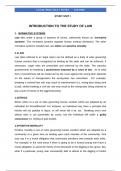LEGAL PRACTICE 1 NOTES LEP15M0
STUDY UNIT I
INTRODUCTION TO THE STUDY OF LAW
1. NORMATIVE SYSTEMS
Law falls under a group of systems of norms, collectively known as ‘normative
systems’. The normative systems regulate human conduct (behavior). The other
normative systems, besides law, are ethics and positive morality.
1.1 LAW
Law (also referred to as ‘legal rules’) can be defined as a body of rules governing
human conduct that is recognized as binding by the state and can be enforced, if
necessary. Legal rules are prescribed and enforced by the state. The sanction
(punishment) for breaking a punishment imposed by a court of law. As to what
form of punishment will be meted out by the court against the wrong-doer depends
on the nature of transgression the wrong-doer has committed. For example,
breaking a criminal law rule may result to imprisonment (i.e. wrong-doer being sent
to jail), whilst breaking a civil law rule may result to the wrong-doer being ordered to
pay a sum of money to the aggrieved party.
1.2 ETHICS
Ethics refers to a set of rules governing human conduct which are adopted by an
individual for himself/herself. For instance, an individual may have a principle that
he/she will not partake in liquor, or will never tell a lie, etc. Breaking one’s own
ethical rules is not punishable by courts, but the individual will suffer a guilty
conscience (i.e. feeling of guilt inside).
1.3 POSITIVE MORALITY
Positive morality is set of rules governing human conduct which are adopted by a
community at a given time as binding upon each member of the community. One
may say it is a moral obligation that community members owe towards each other.
For example, in the rural areas if there is going to be a funeral young men have a
moral obligation to assist the family of the deceased in the digging of the grave. But,
what if a particular young man consistently fails to attend to the digging of tombs
, LEGAL PRACTICE 1 NOTES LEP15M0
without any good reason? The other community members (young men) will, in turn,
refuse to assist the family of that of that young man should someone from that family
pass on. This means the community will isolate that young man. This means that
the punishment for breaking positive morality rules is not through punishment by a
court, but isolation or rejection of the concerned member by the other members
of the community.
2. SOURCES OF THE LAW
The main sources of our law are the following:
(a) The Constitution
(b) Common law
(c) Legislation (statute law)
(d) Judicial precedent (Case law)
(e) Custom
2.1 Constitution
The Constitution of the Republic of SA of 1996 is the supreme law of the country. It
prevails over all other laws. Any law that conflicts with the Constitution is likely to be
declared invalid and of no force and effect.
The Constitution has created three spheres of government, namely the national
government, provincial government and local government.
Further, in terms of the Constitution there are three main organs of State, namely,
legislative authority, executive authority and judicial authority.
2.2 Common Law
The South African common law refers to the unwritten body of laws which emanate
mainly from the Roman-Dutch Law system, as well as from the Roman Law and
English Law systems, as interpreted and applied by the superior courts. It does not
emanate from the legislative authorities. The historic colonization of the country is
the main reason why our common law is composed of legal principles emanating
foreign legal systems.
, LEGAL PRACTICE 1 NOTES LEP15M0
2.3 Legislation (statute law)
Legislation is the law passed by competent legislative authorities, such as
parliament, provincial legislatures, municipal councils, etc. Legislation is always in
writing. Legislation is also called statute/statutory law
Parliament is the main legislative authority. It passes legislation called an Act, (e.g.
National Credit Act, Criminal Procedure Act, etc).
There are two main categories of legislation, namely:
(a) main/primary legislation: It is passed by parliament, and, as a general rule,
applicable nationally; and
(b) Delegated legislation: This refers to law (legislation) which is passed by a
body or person authorized by parliament to make such law. There are four
main types of delegated legislation, namely –
(i) Proclamations: passed by the State President and Ministers.
(ii) Regulations: passed by a Minister to give effect to the purpose of the
main Act.
(iii) Provincial ordinances: passed by the provincial governments and
applicable in the relevant province.
(iv) Municipal by-laws: passed by Municipal Councils and applicable in
the relevant municipal area.
(v) Court rules: passed by the Rules Board for Courts of Law.
2.4 Judicial precedent
Judicial precedent refers to the body of law resulting from decisions on points of law
made by superior courts with regard to the same circumstances.
Although it is not the function of the courts to not make law, they, however, do so in
the process of interpreting and applying existing laws. This will occur, for instance,
where existing law is unclear, confusing, or ambiguous, or where it is in conflict with
the Constitution. For example, in S v Makwanyane 1995 (2) SACR 1 (CC), the
Constitutional Court declared the death penalty to be unconstitutional. The Court did
this even though the death penalty was permitted in terms of section 277(1)(a) of the




